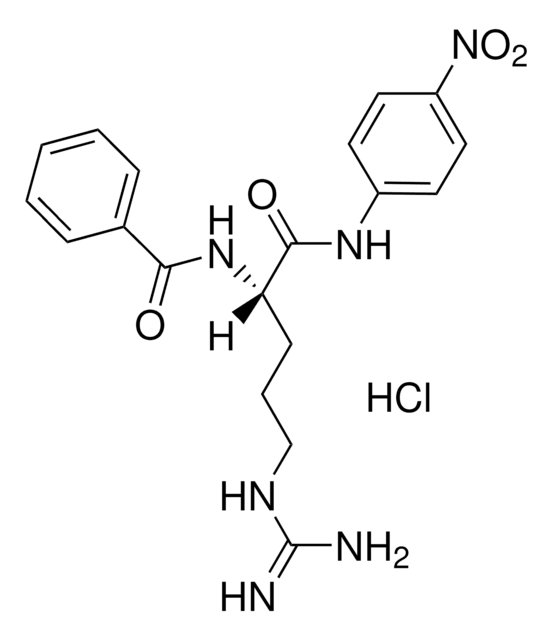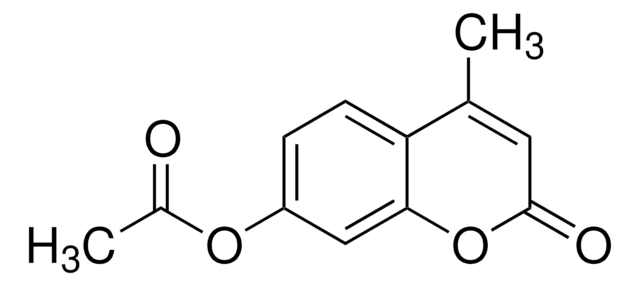N8010
4-Nitrophenyl 4-guanidinobenzoate hydrochloride
protease substrate, ≥95.0% (TLC), powder
Synonyme(s) :
4-Guanidinobenzoic acid 4-nitrophenylester hydrochloride, NPGB, pNPGB
About This Item
Produits recommandés
product name
4-Nitrophenyl 4-guanidinobenzoate hydrochloride, protease inhibitor and substrate
Niveau de qualité
Pureté
≥95.0% (TLC)
Forme
powder
Solubilité
formic acid: soluble 49.00-51.00 mg/mL
Température de stockage
−20°C
Chaîne SMILES
Cl[H].NC(=N)Nc1ccc(cc1)C(=O)Oc2ccc(cc2)[N+]([O-])=O
InChI
1S/C14H12N4O4.ClH/c15-14(16)17-10-3-1-9(2-4-10)13(19)22-12-7-5-11(6-8-12)18(20)21;/h1-8H,(H4,15,16,17);1H
Clé InChI
PKSBDZOBYIKNGY-UHFFFAOYSA-N
Vous recherchez des produits similaires ? Visite Guide de comparaison des produits
Description générale
Application
- as a substrate for trypsin for active site titration experiments
- for pre-treating of mosquito eggs in the interplasmid transposition assay
- as a component of isotonic buffer to moisten filter paper for mosquito embryo collection
Actions biochimiques/physiologiques
Mention d'avertissement
Danger
Mentions de danger
Conseils de prudence
Classification des risques
Eye Dam. 1
Code de la classe de stockage
11 - Combustible Solids
Classe de danger pour l'eau (WGK)
WGK 3
Point d'éclair (°F)
Not applicable
Point d'éclair (°C)
Not applicable
Équipement de protection individuelle
dust mask type N95 (US), Eyeshields, Gloves
Certificats d'analyse (COA)
Recherchez un Certificats d'analyse (COA) en saisissant le numéro de lot du produit. Les numéros de lot figurent sur l'étiquette du produit après les mots "Lot" ou "Batch".
Déjà en possession de ce produit ?
Retrouvez la documentation relative aux produits que vous avez récemment achetés dans la Bibliothèque de documents.
Notre équipe de scientifiques dispose d'une expérience dans tous les secteurs de la recherche, notamment en sciences de la vie, science des matériaux, synthèse chimique, chromatographie, analyse et dans de nombreux autres domaines..
Contacter notre Service technique









